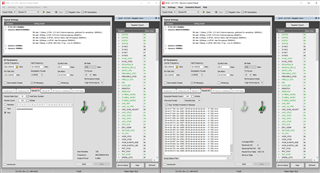Hello,
We are experiencing a major problem with the CC1125 in 4-GFSK mode with consistent byte errors even at very high SNR. We observe with communication between two TI eval boards in SmartRF that when disabling the data whitening (for debug purposes), data bytes 0x88 are never received correctly. It looks like it corresponds to transitions between -fdev/3 +fdev/3. 100% of the transmissions are wrong!
This leads in the application with the whitening to a BER floor of around 4e-5. We cannot go below even with a very good SNR. But very annoying is that the same data payload can be sent multiple times, but never go through a single time.
The bitrate is 133Kbps and the configuration is as follows.
static const registerSetting_t registersSetting2[] = {
{CC112X_IOCFG3, 0xB0},
{CC112X_IOCFG2, 0x06},
{CC112X_IOCFG1, 0xB0},
{CC112X_IOCFG0, 0x40},
{CC112X_SYNC_CFG1, 0x07},
{CC112X_DEVIATION_M, 0x68},
{CC112X_MODCFG_DEV_E, 0x2E},
{CC112X_DCFILT_CFG, 0x04},
{CC112X_PREAMBLE_CFG1, 0x18},
{CC112X_FREQ_IF_CFG, 0x00},
{CC112X_IQIC, 0x00},
{CC112X_CHAN_BW, 0x01},
{CC112X_MDMCFG0, 0x05},
{CC112X_SYMBOL_RATE2, 0x9B},
{CC112X_SYMBOL_RATE1, 0x3D},
{CC112X_SYMBOL_RATE0, 0x08},
{CC112X_AGC_REF, 0x3C},
{CC112X_AGC_CS_THR, 0xEC},
// {CC112X_AGC_CFG3, 0x83},
// {CC112X_AGC_CFG2, 0x60},
{CC112X_AGC_CFG1, 0xA9},
{CC112X_AGC_CFG0, 0xC0},
{CC112X_FIFO_CFG, 0x00},
{CC112X_SETTLING_CFG, 0x03},
{CC112X_FS_CFG, 0x12},
{CC112X_PKT_CFG1, 0x45},
{CC112X_PKT_CFG0, 0x20},
{CC112X_PA_CFG0, 0x03},
{CC112X_PKT_LEN, 0xFF},
{CC112X_IF_MIX_CFG, 0x00},
{CC112X_TOC_CFG, 0x0A},
{CC112X_FREQ2, 0x56},
{CC112X_FREQ1, 0xA6},
{CC112X_FREQ0, 0x66},
{CC112X_IF_ADC0, 0x05},
{CC112X_FS_DIG1, 0x00},
{CC112X_FS_DIG0, 0x5F},
{CC112X_FS_CAL0, 0x0E},
{CC112X_FS_DIVTWO, 0x03},
{CC112X_FS_DSM0, 0x33},
{CC112X_FS_DVC0, 0x17},
{CC112X_FS_PFD, 0x50},
{CC112X_FS_PRE, 0x6E},
{CC112X_FS_REG_DIV_CML, 0x14},
{CC112X_FS_SPARE, 0xAC},
{CC112X_XOSC5, 0x0E},
{CC112X_XOSC3, 0xC7},
{CC112X_XOSC1, 0x07},
{CC112X_END_OF_TABLE, 0x00},
};
But this behavior occurs even with the 200kbps configuration given by SmartRF as shown on the following figure (out of the box).

We can also observe that for the 133kbps configuration, that the error rate depends a bit on the RX filter bandwidth. In the first figure, we can barely send one or two correct bytes (0x88) per packet, while on the second one, it is more 2 or 3.


Is it a know problem in the CC1125 for the 4-GFSK? Is there any wrong with the configuration that we used? We are looking for any help and any hint. Thank you.

